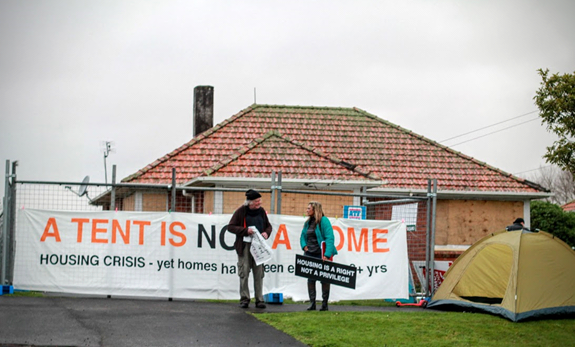Glen Innes protesters camp out over housing crisis
Protesters camped out in the cold and rain outside an empty state house recently

Protesters spent a cold, wet night in tents around two boarded-up Glen Innes houses to draw attention to New Zealand’s housing crisis.
The Tamaki Housing Group ‘A Tent is Not A Home’ overnight occupation called for empty state homes to be made available to homeless people.
Protester and manager of the Island Child Charitable Trust Danielle Bergin said they were trying to raise awareness that some of the homes along here have been empty for over four years.
“It doesn’t seem to be very just or a process that’s full of integrity when they’ve been moving poor people out and the land has been vacant for such a long time,” Bergin said.
Creating Communities property developer Murdoch Dryden, part of a HNZ pilot project in Tamaki, said his company has completed 53 social houses and a remaining 25 are under construction.
Dryden said his company had wanted to use the two boarded-up houses the protesters surrounded for short to medium-term accommodation.
“We were working with Monte Cecilia about a year ago – a homeless housing organisation to use those houses. Before we could get it locked down someone went through the houses and stripped all the wiring and copper and hot water cylinders out for the copper. For the cost of refurbishing and getting the house habitable again, you’re better off just paying for a motel room for them somewhere.”
Dryden estimated the repair costs to be between $20,000 to $30,000 per house.
Vacant homes account for three percent of the 2168 state houses in the Tamaki area.
Housing New Zealand June figures say there are 69 vacant houses in the Tamaki area. Ten are methamphetamine contaminated, 15 are being repaired and 44 are due to be demolished as part of the Tamaki Regeneration Project.
The project aims to replace 2800 Tamaki state homes with 7500 mixed-tenure homes and is expected to take 15 to 20 years to complete.
Driveways to bare sections dot Glen Innes as former state homes are demolished to make way for intensive development.
Protesters expressed concern at the length of time between demolition and construction.
Protester Yvonne Dainty believes the New Zealand government could be breaching United Nation’s human rights laws on the right to adequate housing.
“If the government does not hold up our rights, socially and economically, then they are in breach. We believe now they are in breach of our basic human right to housing.”
University of Otago figures for 2013 say 41,000 New Zealanders experience severe housing deprivation. HNZ currently own 62,923 state homes, 2447 of which are vacant.




